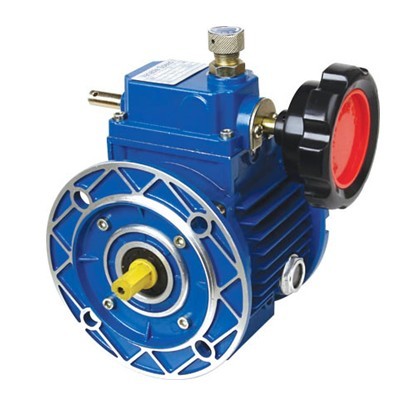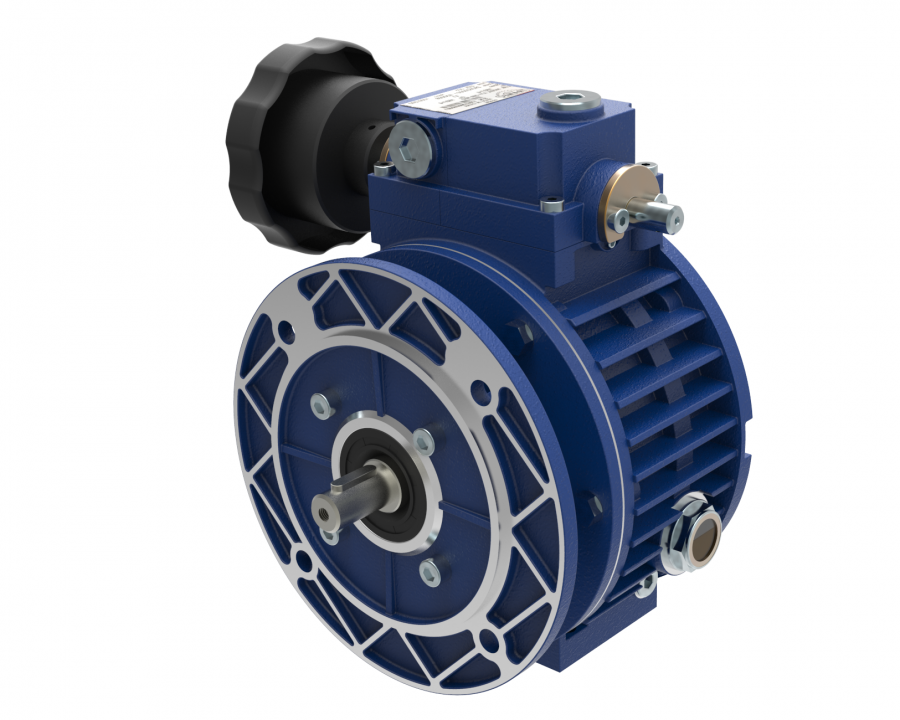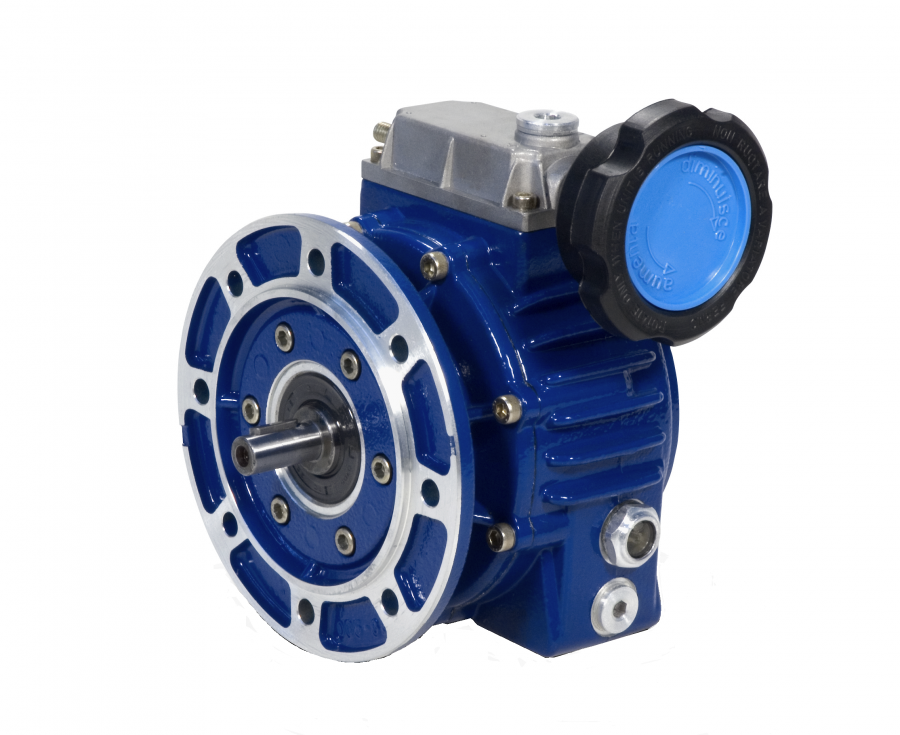Product Description
Variable Gearbox Udl Speed Variator Udl002 Udt571 3 Phase Drive 380 Volts Transmission Machine Best Selling Price Electric Motor Manufacture Variable Gearbox
UDL Series planetary cone & disk step-less speed variator
high quality and low price
pls feel free to contact with us if you have any problem
….
Variator and speed motorvariator
For power ratings from 0,15 to 9,2 kW.
Silent, vibration-free running.
High efficiency.
Bidirectional rotation.
Control handwhel positional on either side.
Speed repeatability at max: ± 0,5%
Speed repeatability at min: ± 0,1%.
Regulaton sensibility: 0,5 rpm.
Casings (TX): diecast aluminium alloy.
Shafts: case hardened and tempered 20Cr steel after ground >HRC60
Internal components: 100Cr6 heat-treated steel.
All the sizes are painted with Ral 5571 blue epoxy-polyester powder.
Variator and speed motorvariator.
For power ratings from 0,15 to 9,2 kW.
Silent, vibration-free running.
High efficiency.
Bidirectional rotation.
Control handwhel positional on either side.
Speed repeatability at max: 0,5%
Speed repeatability at min: 0,1%.
Regulaton sensibility: 0,5 rpm.
Casings (TX): diecast aluminium alloy.
Shafts: case hardened and tempered 20Cr steel after ground >HRC60
Internal components: 100Cr6 heat-treated steel.
All the sizes are painted with Ral 5571 blue epoxy-polyester powder.
/* January 22, 2571 19:08:37 */!function(){function s(e,r){var a,o={};try{e&&e.split(“,”).forEach(function(e,t){e&&(a=e.match(/(.*?):(.*)$/))&&1
| Application: | Motor, Machinery, Agricultural Machinery |
|---|---|
| Hardness: | Hardened Tooth Surface |
| Installation: | Vertical Type |
| Layout: | Coaxial |
| Type: | Worm Reducer |
| Rated Power: | 0.06-15kw |
| Samples: |
US$ 9999/Piece
1 Piece(Min.Order) | |
|---|

What factors should be considered when selecting the right variator gearbox for an application?
When selecting the right variator gearbox for an application, several factors should be considered to ensure optimal performance and compatibility. Here are the key factors to take into account:
- Load Requirements: The first consideration is the load requirements of the application. Determine the torque and speed range needed for the gearbox to handle the load effectively. Consider factors such as peak torque, continuous torque, and variations in torque and speed during operation. Understanding the load requirements is crucial in selecting a variator gearbox that can handle the specific demands of the application.
- Speed Control: Evaluate the desired level of speed control required for the application. Determine whether precise speed adjustments are necessary or if a broader range of speed variation is acceptable. Consider the speed range, responsiveness, accuracy, and stability required for the application. Certain variator gearboxes may offer more precise speed control, while others prioritize broader speed ranges.
- Environmental Conditions: Assess the environmental conditions in which the variator gearbox will operate. Consider factors such as temperature extremes, humidity, dust, and potential exposure to chemicals or corrosive substances. Choose a gearbox that is designed to withstand the specific environmental conditions of the application, ensuring long-term reliability and durability.
- Space Constraints: Evaluate the available space for installing the variator gearbox. Consider the dimensions, mounting options, and any spatial limitations imposed by the application. Ensure that the selected gearbox can be accommodated within the available space without compromising other components or functionality.
- Efficiency: Consider the desired level of efficiency for the application. Evaluate the gearbox’s efficiency under different load conditions and compare it to the efficiency requirements of the application. Higher efficiency gearboxes can contribute to energy savings and reduced operating costs over the lifespan of the equipment.
- Operational Requirements: Define any specific operational requirements of the application. Consider factors such as noise level, vibration, maintenance needs, and expected service life. Choose a variator gearbox that meets the operational requirements and aligns with the maintenance capabilities and schedules of the application.
- Cost and Budget: Consider the budgetary constraints and cost-effectiveness of the variator gearbox. Evaluate the overall cost of the gearbox, including initial purchase cost, installation expenses, and potential maintenance or replacement costs over time. Balance the cost considerations with the performance and reliability requirements of the application.
- Application Specifics: Take into account any unique requirements or specifications of the application. Consider factors such as industry standards, regulatory compliance, compatibility with other system components, and any specific features or functionalities required. Ensure that the selected variator gearbox aligns with the specific needs and specifications of the application.
By carefully considering these factors, you can select the right variator gearbox that matches the load requirements, speed control needs, environmental conditions, space constraints, efficiency targets, operational requirements, budget, and application specifics. This will result in an optimized gearbox selection that meets the performance, reliability, and functionality requirements of the application.

How do manufacturers ensure the durability of variator gearboxes in industrial environments?
Manufacturers employ various strategies and techniques to ensure the durability of variator gearboxes in industrial environments. These measures are implemented during the design, construction, and testing stages to enhance the gearbox’s ability to withstand the harsh conditions and rigorous demands of industrial applications. Here’s how manufacturers ensure the durability of variator gearboxes:
Rugged Construction:
Manufacturers use robust and durable materials for constructing variator gearboxes. High-quality metals, such as steel or cast iron, are commonly used for gearbox housings and essential components. These materials possess excellent strength, wear resistance, and thermal stability, enabling the gearbox to withstand heavy loads, vibrations, and temperature variations typically encountered in industrial environments.
Enhanced Gear Design:
The gear design of variator gearboxes is optimized for durability. Manufacturers carefully select gear materials, tooth profiles, and surface treatments to minimize wear, improve load distribution, and enhance the gearbox’s ability to handle torque and shock loads. Advanced manufacturing techniques, such as precision machining and heat treatment processes, are employed to ensure the gears have the required hardness, toughness, and dimensional accuracy for long-lasting performance.
Sealing and Protection:
Variator gearboxes are equipped with effective sealing systems to prevent the ingress of contaminants, such as dust, dirt, and moisture, into the gearbox. Seals, gaskets, and O-rings are used to create a barrier that protects internal components from environmental elements. Additionally, manufacturers often incorporate protective measures, such as breather vents or pressure relief valves, to maintain an appropriate internal pressure and prevent the buildup of excessive heat or pressure that could compromise the gearbox’s durability.
Effective Lubrication:
Proper lubrication is critical for the durability of variator gearboxes. Manufacturers ensure that the gearbox is designed with efficient lubrication systems that provide adequate lubricant flow to all critical components. This lubrication helps reduce friction, dissipate heat, and prevent excessive wear and corrosion. Manufacturers may also specify the use of specific lubricants that are suitable for the operating conditions and requirements of the variator gearbox, further enhancing its durability.
Thorough Testing and Quality Control:
Manufacturers subject variator gearboxes to rigorous testing procedures to validate their durability in industrial environments. These tests may include load testing, endurance testing, temperature cycling, and performance verification. Through comprehensive testing, manufacturers can identify potential weaknesses or design flaws and make necessary improvements to ensure the gearbox’s durability. Additionally, stringent quality control measures are implemented throughout the manufacturing process to maintain consistency and reliability in the production of variator gearboxes.
Compliance with Standards and Regulations:
Manufacturers adhere to industry standards and regulations to ensure the durability and safety of variator gearboxes. Compliance with standards, such as ISO (International Organization for Standardization) and specific industry guidelines, helps manufacturers design and manufacture gearboxes that meet or exceed the required performance and durability criteria. This ensures that the variator gearboxes are suitable for use in industrial environments and can withstand the demanding operating conditions they may encounter.
By employing rugged construction, enhanced gear design, sealing and protection measures, effective lubrication systems, thorough testing and quality control, and compliance with standards and regulations, manufacturers ensure the durability of variator gearboxes in industrial environments. These measures contribute to the reliability, longevity, and performance of variator gearboxes, making them well-suited for demanding industrial applications.

What benefits do variator gearboxes offer in various industrial applications?
Variator gearboxes offer several benefits in various industrial applications, making them valuable components in numerous systems. Here are some of the key advantages they provide:
- Continuously Adjustable Speed: One of the primary benefits of variator gearboxes is their ability to provide continuously adjustable speed control. Unlike traditional gearboxes with fixed gear ratios, variators offer stepless speed variation within a certain range. This feature allows for precise control of rotational speeds in industrial machinery, optimizing performance and efficiency in different processes.</li
- Optimized Power Efficiency: Variator gearboxes help optimize power efficiency in industrial applications. By allowing for continuous speed adjustment, they enable the machinery to operate at the most efficient speed for a given task. This ensures that the system consumes only the necessary amount of power, minimizing energy waste and reducing operating costs.
- Flexible Torque Transmission: Variator gearboxes can handle a wide range of torque requirements, making them suitable for various industrial applications. They can transmit high torque while maintaining their efficiency, allowing industrial machinery to generate the necessary power for demanding tasks. This flexibility in torque transmission contributes to the versatility and adaptability of variator gearboxes in industrial settings.
- Smooth and Precise Control: Variator gearboxes provide smooth and precise control over rotational speeds. The stepless speed adjustment allows for seamless transitions between different speeds without sudden jumps or changes. This smooth control enhances the precision and accuracy of industrial processes, ensuring consistent performance and high-quality output.
- Improved System Performance: By enabling precise speed control, variator gearboxes enhance the overall performance of industrial systems. They allow machinery to operate at the optimal speed for specific tasks, leading to improved productivity, reduced cycle times, and enhanced product quality. The ability to fine-tune the speed also facilitates better synchronization between different components or processes, further optimizing system performance.
- Reduced Mechanical Stress: Variator gearboxes can help reduce mechanical stress on industrial machinery. By allowing for gradual speed adjustments, they minimize sudden changes in load or torque, which can put excessive stress on components. This reduction in mechanical stress contributes to extended equipment lifespan, reduced maintenance requirements, and improved reliability in industrial applications.
- Adaptability to Changing Conditions: Variator gearboxes offer adaptability to changing operating conditions. They allow for real-time adjustments in speed, which is particularly beneficial in applications where the load or process requirements vary. This adaptability enables industrial machinery to respond quickly to changing demands, ensuring optimal performance and efficiency in dynamic environments.
In summary, variator gearboxes provide benefits such as continuously adjustable speed control, optimized power efficiency, flexible torque transmission, smooth and precise control, improved system performance, reduced mechanical stress, and adaptability to changing conditions. These advantages make variator gearboxes valuable in various industrial applications, including manufacturing, material handling, packaging, robotics, and many others, where precise speed control and efficient power transmission are essential.


editor by CX 2024-04-10
